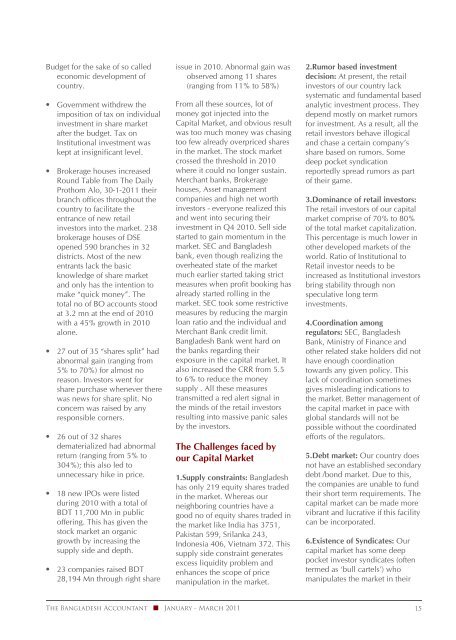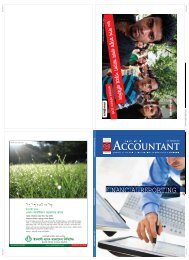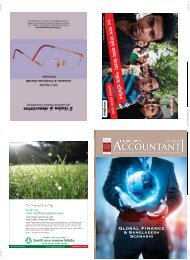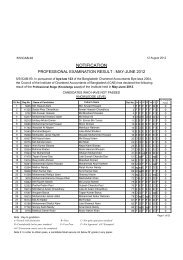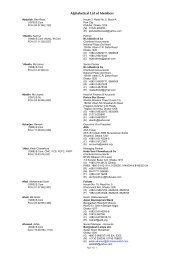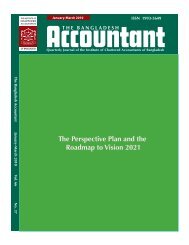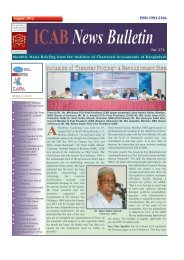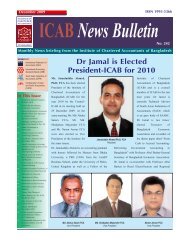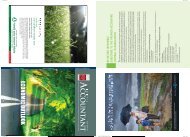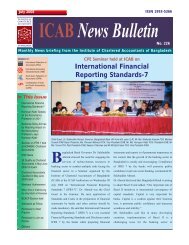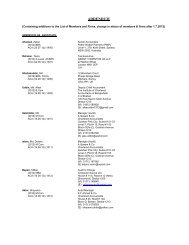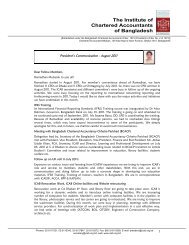Forma # 1.ai - ICAB
Forma # 1.ai - ICAB
Forma # 1.ai - ICAB
Create successful ePaper yourself
Turn your PDF publications into a flip-book with our unique Google optimized e-Paper software.
Budget for the sake of so called<br />
economic development of<br />
country.<br />
• Government withdrew the<br />
imposition of tax on individual<br />
investment in share market<br />
after the budget. Tax on<br />
Institutional investment was<br />
kept at insignificant level.<br />
• Brokerage houses increased<br />
Round Table from The Daily<br />
Prothom Alo, 30-1-2011 their<br />
branch offices throughout the<br />
country to facilitate the<br />
entrance of new retail<br />
investors into the market. 238<br />
brokerage houses of DSE<br />
opened 590 branches in 32<br />
districts. Most of the new<br />
entrants lack the basic<br />
knowledge of share market<br />
and only has the intention to<br />
make “quick money”. The<br />
total no of BO accounts stood<br />
at 3.2 mn at the end of 2010<br />
with a 45% growth in 2010<br />
alone.<br />
• 27 out of 35 “shares split” had<br />
abnormal gain (ranging from<br />
5% to 70%) for almost no<br />
reason. Investors went for<br />
share purchase whenever there<br />
was news for share split. No<br />
concern was raised by any<br />
responsible corners.<br />
• 26 out of 32 shares<br />
dematerialized had abnormal<br />
return (ranging from 5% to<br />
304%); this also led to<br />
unnecessary hike in price.<br />
• 18 new IPOs were listed<br />
during 2010 with a total of<br />
BDT 11,700 Mn in public<br />
offering. This has given the<br />
stock market an organic<br />
growth by increasing the<br />
supply side and depth.<br />
• 23 companies raised BDT<br />
28,194 Mn through right share<br />
issue in 2010. Abnormal gain was<br />
observed among 11 shares<br />
(ranging from 11% to 58%)<br />
From all these sources, lot of<br />
money got injected into the<br />
Capital Market, and obvious result<br />
was too much money was chasing<br />
too few already overpriced shares<br />
in the market. The stock market<br />
crossed the threshold in 2010<br />
where it could no longer sustain.<br />
Merchant banks, Brokerage<br />
houses, Asset management<br />
companies and high net worth<br />
investors - everyone realized this<br />
and went into securing their<br />
investment in Q4 2010. Sell side<br />
started to gain momentum in the<br />
market. SEC and Bangladesh<br />
bank, even though realizing the<br />
overheated state of the market<br />
much earlier started taking strict<br />
measures when profit booking has<br />
already started rolling in the<br />
market. SEC took some restrictive<br />
measures by reducing the margin<br />
loan ratio and the individual and<br />
Merchant Bank credit limit.<br />
Bangladesh Bank went hard on<br />
the banks regarding their<br />
exposure in the capital market. It<br />
also increased the CRR from 5.5<br />
to 6% to reduce the money<br />
supply . All these measures<br />
transmitted a red alert signal in<br />
the minds of the retail investors<br />
resulting into massive panic sales<br />
by the investors.<br />
The Challenges faced by<br />
our Capital Market<br />
1.Supply constraints: Bangladesh<br />
has only 219 equity shares traded<br />
in the market. Whereas our<br />
neighboring countries have a<br />
good no of equity shares traded in<br />
the market like India has 3751,<br />
Pakistan 599, Srilanka 243,<br />
Indonesia 406, Vietnam 372. This<br />
supply side constraint generates<br />
excess liquidity problem and<br />
enhances the scope of price<br />
manipulation in the market.<br />
2.Rumor based investment<br />
decision: At present, the retail<br />
investors of our country lack<br />
systematic and fundamental based<br />
analytic investment process. They<br />
depend mostly on market rumors<br />
for investment. As a result, all the<br />
retail investors behave illogical<br />
and chase a certain company’s<br />
share based on rumors. Some<br />
deep pocket syndication<br />
reportedly spread rumors as part<br />
of their game.<br />
3.Dominance of retail investors:<br />
The retail investors of our capital<br />
market comprise of 70% to 80%<br />
of the total market capitalization.<br />
This percentage is much lower in<br />
other developed markets of the<br />
world. Ratio of Institutional to<br />
Retail investor needs to be<br />
increased as Institutional investors<br />
bring stability through non<br />
speculative long term<br />
investments.<br />
4.Coordination among<br />
regulators: SEC, Bangladesh<br />
Bank, Ministry of Finance and<br />
other related stake holders did not<br />
have enough coordination<br />
towards any given policy. This<br />
lack of coordination sometimes<br />
gives misleading indications to<br />
the market. Better management of<br />
the capital market in pace with<br />
global standards will not be<br />
possible without the coordinated<br />
efforts of the regulators.<br />
5.Debt market: Our country does<br />
not have an established secondary<br />
debt /bond market. Due to this,<br />
the companies are unable to fund<br />
their short term requirements. The<br />
capital market can be made more<br />
vibrant and lucrative if this facility<br />
can be incorporated.<br />
6.Existence of Syndicates: Our<br />
capital market has some deep<br />
pocket investor syndicates (often<br />
termed as ‘bull cartels’) who<br />
manipulates the market in their<br />
The Bangladesh Accountant January - March 2011 15


